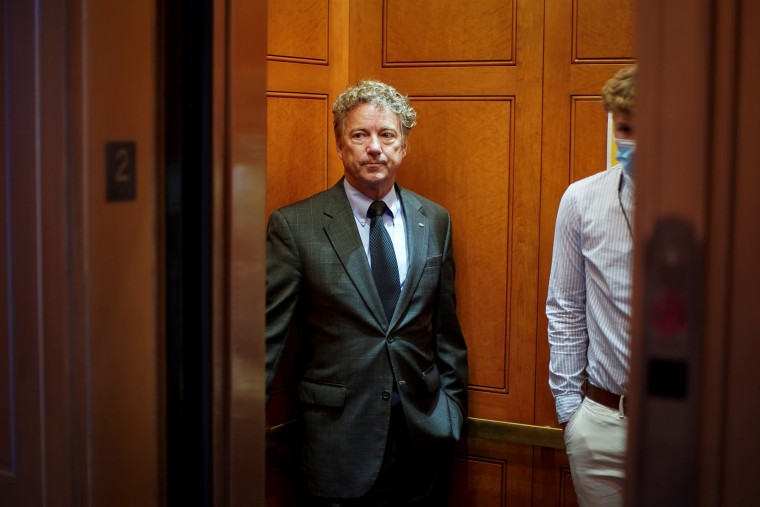Sen. Rand Paul (R-Ky.) had a difficult 2020 on a variety of fronts, but the new year offers the Republican senator an opportunity for a fresh start.
It's not going especially well.
On Inauguration Day, for example, President Joe Biden denounced the rise in political extremism, white supremacy, and domestic terrorism, describing the threats as a societal scourge "that we must confront and we will defeat." The Kentucky senator ran to Fox News to say he was insulted by the remarks.
Yesterday, Paul was nevertheless invited onto ABC News's "This Week," for an unfortunate interview. As Politico noted:
Sen. Rand Paul on Sunday got into a heated exchange with ABC host George Stephanopoulos over the disproven claim that the 2020 presidential election was stolen — days after President Joe Biden was inaugurated.
As the network transcript makes clear, the GOP senator did not appear to be in a reasonable mood. Rand Paul refused, for example, to acknowledge the legitimacy of the election that put Biden in the White House. He also suggested the courts didn't consider Team Trump's evidence, which is just patently false: while some cases were rejected on procedural grounds, more than a few judges offered the former president's attorneys an opportunity to bolster their claims with proof. Those opportunities proved pointless: Trump's lawyers failed spectacularly to present credible evidence.
But on and on Rand Paul went, suggesting conspiracy theorists may yet get favorable Supreme Court rulings, and pointing to polls of Republican voters, who've come to believe ridiculous conspiracy theories, as evidence of ... something.
It fell to Stephanopoulos to remind the confused senator, "Seventy-five percent of Republicans agree with you because they were fed a big lie by President Trump and his supporters who say the election was stolen."
But there was one line in particular from the interview that stood out for me. Paul told the host the role he expected journalists to play while many Republicans attack the integrity of their own country's electoral system:
"George, where you make a mistake is that people coming from the liberal side like you, you immediately say everything's a lie instead of saying there are two sides to everything. Historically what would happen is, if I said that I thought that there was fraud, you would interview someone else who said there wasn't."
After a contentious back and forth, Stephanopoulos eventually reminded his guest, "I'm standing by facts. There are not two sides to facts.... It is a lie to say it was stolen."
It was an enlightening exchange because it shed light on a pernicious strategy. Rand Paul wants not only to peddle nonsense, he also wants independent news organizations to present his nonsense to the public as if it has merit.
In the Republican's vision, journalists have a responsibility to present the public with both lies and facts. Media professionals who alert the electorate to the truth, in Paul's vision, are doing the public a disservice. Real journalism, according to the hapless senator, means giving equal weight to garbage and reality.
Only "the liberal side" disagrees.
To be sure, in more instances than anyone could possibly count, this both-sides approach was -- and in some circles, is -- a popular approach to reporting the news. But thankfully, Rand Paul is not a news director or an editor, and responsible media professionals are telling the public the truth: the election was not stolen. The Republicans' Big Lie has no basis in fact.

